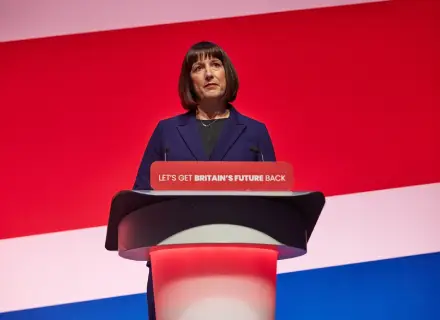United Kingdom Finance Minister Rachel Reeves has termed the latest report on the British economy as “disappointing,” as data showed that the European country’s GDP fell by an unexpected 0.1% in October 2024, adding to indications of a larger-than-expected decline.
According to the Office for National Statistics, industrial and construction output fell in October, while the services sector stagnated.
“While the figures this month are disappointing, we have put in place policies to deliver long-term economic growth,” Rachel Reeves stated.
Significant tax increases on businesses were part of her October 30 budget declaration, and starting in November 2024, GDP figures will directly reflect these changes.
There was “mixed” anecdotal evidence for the budget impact, according to an ONS (Office for National Statistics) statistician. Some businesses said that customers waiting for Rachel Reeves’ statement had impacted turnover. Others brought forward activity.
The BoE reduced its 2024 annual growth estimate from 1.25% to 1% last month, but it still projected a stronger 2025 growth rate of 1.5%, which reflected the short-term stimulus to the economy provided by Finance Minister Rachel Reeves’ large-scale budget plans.
Since the COVID-19 pandemic, Britain’s economic production has expanded modestly. Rising energy prices following Russia’s invasion of Ukraine severely impacted Germany, the only major advanced economy to perform considerably worse.
Prime Minister Keir Starmer stated in December 2024 that he wanted Britain to have the fastest GDP growth per capita among the Group of Seven (G7) advanced nations.
The latest further means the economy has only grown in one of the four months since the Labour government took power, compounding a shaky start since their landslide victory in the July 4 election. One of the election promises of the party, which made a stunning comeback after being out of power for 14 years, was to improve living standards and boost growth to the highest in the Group of Seven on a sustained basis, a pledge economists see as ambitious.
However, the new administration is now facing an uphill battle, with the jobs market cooling, mortgage and energy costs rising, and businesses threatening to pass on a huge payroll-tax increase by raising consumer prices and cutting jobs. A separate survey showed subdued consumer confidence in December. The economy has shown no growth since the election.
Moreover, headwinds from abroad may build in 2025 if a full-blow trade war triggered by Donald Trump’s return to the White House weakens the global economy.
The British economy has slowed sharply since Keir Starmer took office, expanding just 0.1% in the Q3 after outpacing all of its G-7 peers in the first half with a 1.2% surge. The fall in GDP in October will raise questions over the fourth quarter. Forecasts are for growth of 0.3% to 0.4%, with a similar pace maintained over the next two years.
A big drag on the economy has been the consumer-facing services where output tumbled 0.6%, including a 2% decline in pubs and restaurants. It suggests that households tightened their belts, possibly fearing a squeeze from the budget. They were later largely spared most of the 40 billion pound of tax hikes with businesses shouldering the burden.

